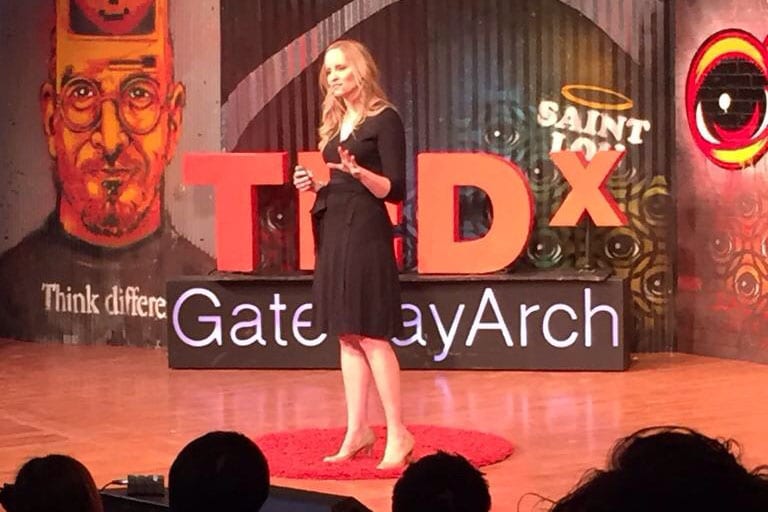Reading time: 4 minutes
When Kyra Krakos, PhD, assistant professor of biology, delivered a lecture on “Plants, Pollinators and People: A Love Story,” at the Sheldon Concert Hall, it wasn’t her usual presentation. This time, it was for TEDx Gateway Arch, and she wowed an audience of 500 people.
“It’s a lecture I’ve delivered hundreds of times and I’ve had to make it interesting,” says Krakos, who also serves as a research associate at the Missouri Botanical Garden. “Plant scientists have to work harder than many other scientists to generate interest in their research. ‘Save the Sunflower’ doesn’t get people excited.”
Krakos was chosen by TEDx Gateway Arch to deliver the 16-minute talk, one of 17 presentations during the event, held last February. TEDx programs are independently organized by communities, organizations and individuals at the local level. The events are produced under a free license from TED, the highly successful national nonprofit with the tagline, “ideas worth spreading.”
“How do you solve the basic problems in life: survival, finding a mate and getting your babies out into the world, if you can’t move?” Krakos asks her audience. She likens the dilemma of plant life to a middle school dance – girls on one side, boys on the other and they’re never going to meet.
She goes on to explain male and female plant body parts in human sexual terms and the critical role played by bees, birds, butterflies, bats and other pollinators to make babies (seeds).
“Remember, plants can’t move,” she says. “They can’t walk across that dance floor and give their pollen to a likely candidate. This immobility is a huge deal.”
With slides of colorful flowers, and frank talk of promiscuous sex among the daisies, Krakos explains her study of 54 Oenothera flower species. Her research question: How accurate are pollination syndromes and how good are they at predicting who pollinates you based on your traits?
“Take the Ophrys orchid,” she tells her audience while flashing a slide of an exotic purple, yellow and white flower with red fuzzy edges. “It looks and smells like a female wasp in heat. Any guesses on the pollinator? It would be a male wasp, albeit a sexually frustrated male wasp.”
Krakos says the TEDx Talk required her to deliver a lot of scientific information to a large audience of laymen. Unlike the hundreds of days she walked into her classroom and offered the same presentation, however, at TEDx there were endless details, months of practice and very specific rules she had to follow.
“I couldn’t be too technical, it had to have a narrative, a discovery, and it had to have a call to action,” Krakos says.
Krakos’ call to action ends on a hopeful note, because saving the “small but mighty pollinators” seems doable.
“Why do we care about plant sex or predicting pollinators?” she asks. “Because plants can’t move. And as our climate changes, our world alters and more habitat is lost so that plant/pollinator relationship becomes broken, fractured, uncoupled. And we humans face serious consequences.”
Krakos says 85 percent of flowering plants must have a pollinator to succeed.
“Over 100 of our crop plants must have a pollinator or we go hungry,” she says. “And we can’t do what pollinators do. But you and I can do something to help them today. Build a bee house, plant native plants in your yard, the corner lot, at the edges of a crop field. We need pollinators and they need us.”
Krakos says the Maryville community was highly supportive as she prepared for the presentation. Administrators, faculty and students attended the event. The University is a sponsor of TEDx Gateway Arch events.
“To take something you’ve been doing for years and look at it in a new way – I thought it was a wonderful learning experience. I was thankful for the opportunity,” Krakos says.
Watch Krakos’ TEDx Talk here, or below.
 krakos.H
krakos.H